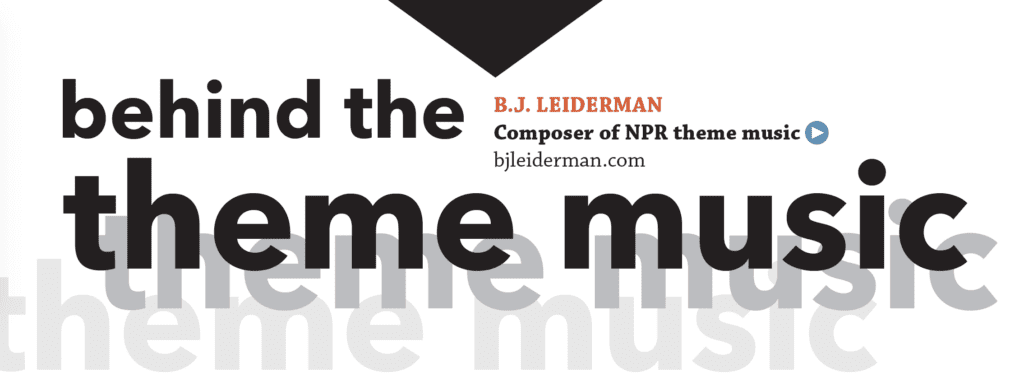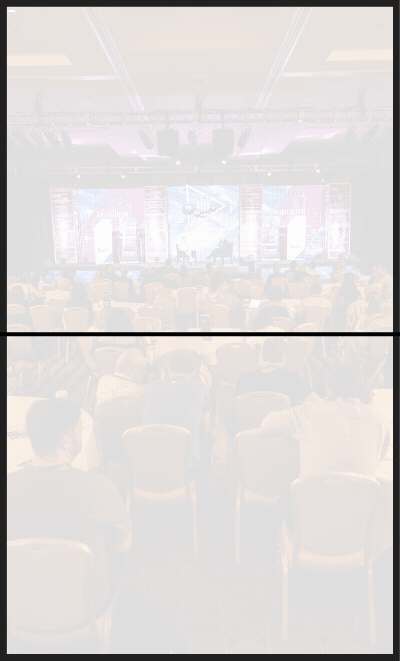This article was originally published in the May 2016 issue of Podster Magazine.

PODSTER: The first theme you composed for NPR was for Morning Edition when it premiered back in the late 70s. What were you going for with this composition?
B.J. LEIDERMAN: Back in those days most of the NPR stations were coming out of classical music programs at 5 and 6 in the morning, so the idea was not to jar people awake or out of that tone if they were already listening to classical, but to wake them up gently. The very first arrangement of the Morning Edition theme started with some sort of a slow classical intro that I did on an electronic keyboard. And we had a flute, and then we did the same backward-type shenanigans that the Beatles used to do with their tapes. We turned the tape over backward in the tape machine and recorded a cymbal crash and a piano chord and then when you played it the correct way it just came out of nowhere. So that was our “whoosh,” a whoosh into the real musical intro, the contemporary stuff, so that people didn’t feel like they were bonked over the head.
PODSTER: So then you kind of became the go-to guy for NPR theme music, composing theme music for, among other shows, Car Talk, Wait Wait … Don’t Tell Me, and Weekend Edition. Do you tailor each piece to the show, or is there an NPR style that you adhere to?
B.J.: I think they kept coming back to me because the music had legs, meaning that the way I write is I write a melody. I actually like something that is hummable in the song. There’s a lot of nice beats, chord structure, and groove going on there too, but one of the keys to the success of the music is that it is memorable and hummable. So I think NPR was comfortable with that and figured, okay, the next show, Weekend Edition, let’s run that by him, and came up with something that was a little more flamboyant with strings. At that time, and this is a very important point in the story, they had introduced me to an arranger by the name of Jim Pugh. He was a trombone player and an A list session player in New York City when I lived there. And they put me together with him to do the second arrangement of Morning Edition, and from then on it was me and Jim Pugh. Whenever you hear something that has an orchestra in it, it’s Jim’s work. I’m proud to say that for the past decade or so, Jim has been a part of Steely Dan. He’s been playing on their albums and touring with them. So I was on my way to being the defacto public radio sound. And that’s—not saying that with a big head or anything, but I only have a certain bag of tricks when it comes to chord structure and melody and by now, people are going, oh, that sounds like Leiderman, and that’s sort of a comfort zone for them. I guess that’s why they kept coming back.
PODSTER: What’s the most recent theme you’ve written for NPR?
B.J.: The most recent NPR-produced show was Science Friday—that was a couple of years ago. I had to sit down to figure out, okay, science, science. I liked science in high school and stuff, but I was never too good at it as far as tests go. I went to a default position of, what can I do musically that sounds like science? One thing was particles: very short staccato notes, and the other was waves. So I had my guitar player do nice long pedals in legato chords, and I put that to a groovy beat. The funny thing is, Science Friday is the first theme I’ve done for NPR that really doesn’t have a melody, per se. Its melody is in the chord structure, with me banging on that piano like a drum set. I thought that was interesting.
PODSTER: So, you were a Beatles fan as a kid and have been influenced by the Beatles. What have you learned about composing music from them?
B.J.: It’s interesting to have grown up with the Beatles because at first you get swept up in all the Beatlemania. I had a little band when I was in elementary school. Growing up with them you don’t know really what they’re made of. You know something is going on, but I became aware of certain things that made them special only in the last few decades. I started realizing that what’s different about the Beatles and all these other rock bands I listened to. The first thing that came to mind was that they had evolved. The jump from the first two albums to Rubber Soul, which was basically them inventing the unplugged scene all by themselves, is incredible. And then from there, to ramp it up to Revolver, and, wait a minute, they kept their audience. Yes! Their audience came with them. The Beatles managed to capture my generation. And they managed to capture my parents’ generation too because, again, of melody.
PODSTER: Do you perform? Have you had a musical career outside of your jingle writing and composing for NPR?
B.J.: I’ve had a crazy musical career. I wouldn’t say it was particularly brave. I think the only brave thing I did really—I did absolutely nothing as far as music is concerned for a while there. I mean a decade went by and I really didn’t do anything. But I did ask for a leave of absence from American University during my junior year to go across the country with a band with high school friends. We went across the country from Virginia Beach to Santa Barbara and back, stopping at various cities. We had a blast, but we were basically a cover band. But we would play these particularly difficult and interesting arrangements of stuff that no other band was touching at the time. For instance, Abbey Road all the way through and a Moody Blues medley and most of Tommy by The Who, so even though we played cover tunes, we were an original act because of the things we chose to play.
This article was originally published in the May 2016 issue of Podster Magazine.



Join the Movement